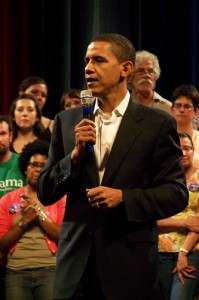Obama on Spanish TV: Jiu Jitsu or Sleight-of-Hand?
 How many of you watched President Obama’s town hall meeting on Univision?
How many of you watched President Obama’s town hall meeting on Univision?
I ask because a report in The Hill names the Spanish language broadcaster as an influencer in the coming 2012 presidential election. I’m sure most of this has to do with the revealing Census reports and the growing talk about Latino political influence as a whole. News Taco has been doing a lot of that talking becasue we believe, by and large, that it’s true.
But the truth is also that only 41 percent of Latinos in the US are eligible to vote – that is, citizens over 18 years of age. Of those a smaller percentage is registered to vote and of that small percentage an even smaller number actually goes to the polls on election day. That can and will change, I have no doubt. I wonder, though, if Spanish media is the most effective way to make a political campaign point.
First, as a matter of full disclosure, I have to say that I spent several decades working in Spanish language news – Univision and Telemundo. And as far as informing the Spanish dominant community in the US is concerned, there is no better way than to use Spanish media. Marketers discovered this many years ago. I’ve always considered Spanish language news as the best place to tell stories that mattered to the community more than to corporate stockholders. In fact not too long ago I agreed to be a guest on Univision’s Al Punto con Jorge Ramos, precisely because of the network’s reputation, reach and influence.
My question, though, is not about Spanish language media’s reach and influence in general, but specifically about its influence in elections. How many Latino voters watch Spanish TV?
If I were a political campaign advisor I’d urge candidates to go on Spanish TV – the mere appearance of reaching out to Latino voters is worth the effort. Also, the viewer may not be eligible to vote but he or she may soon be, and their children will become voters as well (if they aren’t already of voting age). So there is a definite ripple influence that argues for going on Spanish media for the sake of future returns (there are at least one million Latino 16 and 17 year-olds who will be eligible to vote by 2012).
All of this assumes that Obama’s appearance on Univision was politically motivated. But consider that he’s already set-up a campaign shop in Chicago – his reelection campaign is up and running. Consider also the number of politically motivated websites that have been set up by politicians and political organizations with the intent of attracting Latino voters, many of those sites have Spanish language options. Obama is not alone in gauging the potential.
Something else to consider: the president chose to talk about education in his town hall meeting. Education has been, for many, many years, the most impotrtant issue for Latinos in poll after poll. It hasn’t been until recently that immigration crept-up the ranks in opinion polls, and that mainly because of the fervent and relentless anti-immigration drum beat from the extreme right.
It’s political jiu jitsu to let the opposition carry an unpopular banner: let them make noise and look bad in the process. But it’s also sleight-of-hand on Obama’s part. He’s been playing both sides against the middle, and that’s a dangerous game. His “silent raids,” where federal agents are conducting employee audits in companies across the country, have been very successful (if by success you mean an increase in the number of deportations). The Obama silent raids have outpaced Bush’s overt raids, and that sits well with a specific segment of the voting public. But the silent raids are also causing distress among the undocumented and their families, who all watch Spanish TV but can’t vote.
Education, then was the perfect cover, er, topic, for Obama’s appearance on Univision. I expect to see more like it. But I still wonder: how many of you reading this watched?”
Follow Victor Landa on Twitter: @vlanda
[Photo Courtesy Allison Harger]

